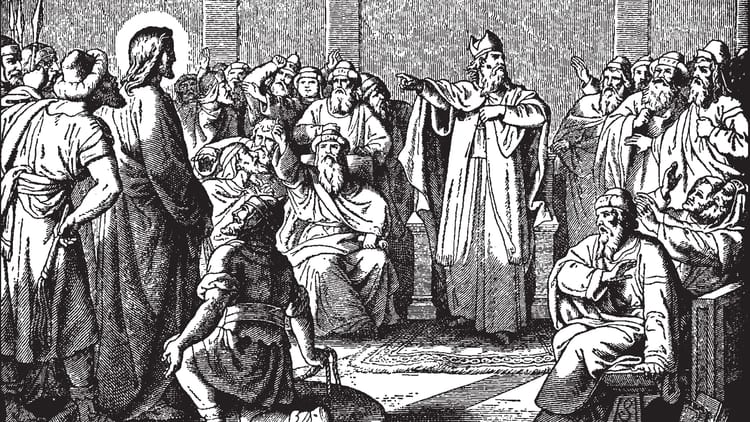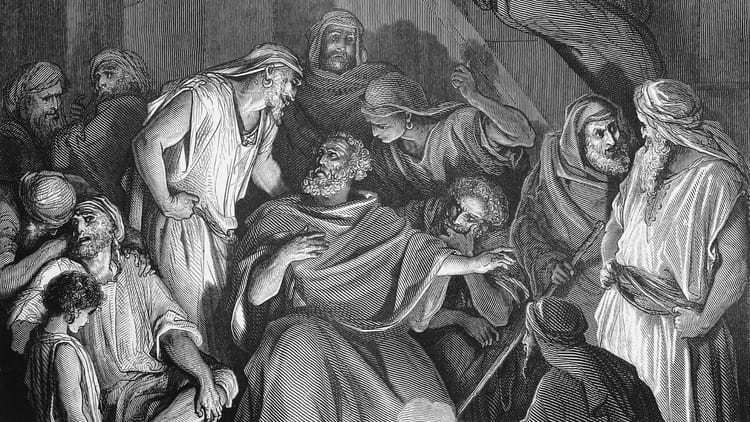Two Questions (Mark 8:27-9:13)

Executives who get paid a lot of money sometimes say that any reasonably intelligent person could do 80% of their job. What they are paid for is the 20% of decisions that go beyond what the average person can do. They’re paid to answer the 20% of tough questions that make all the difference.
When you think about it, you make many decisions every day, but there have been only a few critical questions you have answered, decisions that you have made, that have made most of the difference in your life. Where will I live? What will I do with my life? Who will I marry? You answer dozens of questions every day, but the answers to just a few questions have made all the difference in your life.
Today I want to look at two of the most important decisions you will ever answer. We’ve been looking at the Gospel of Mark since September, and the entire book has been building to these two questions. How you answer these questions will change everything.
So let’s look at these two questions.
Question one: Who is Jesus?
The first question we all need to answer is simple: Who is Jesus? You may be wondering why this is such an important question. It’s not usually important for us to be able to answer who someone is that lived two thousand years ago. If I asked you who Thomas Edison is, it would be nice if you could answer, but it would hardly be life-changing. You may win a trivia game, but it won’t change your life. If Jesus is just another person – even a great person – then it won’t change your life. But if Jesus is who Christians claim him to be, then this question is far more than trivia. We need to face this question.
We’re going to see two ways that Mark helps us answer this question as we look at this passage. The two ways that we’re going to see are going to line up with the way a lot of us have wrestled with this question ourselves.
One way that we can deal with this question is by grappling with all of the evidence. Do you realize that for eight chapters, this has been what’s happened so far in the Gospel of Mark? In chapter 1, Mark introduced his Gospel this way: “The beginning of the good news about Jesus the Messiah…” Mark has told us right at the start who he understands Jesus to be. But nobody we’ve encountered has that insider information. What we have instead is an account of what Jesus did and said. We’ve been encountering Jesus, and some of us have been doing the very same thing that the characters have been doing. We’ve been wrestling with who this Jesus is. Our question may be the same one that the disciples asked back in 4:41: “Who then is this, that even the wind and the sea obey him?” (ESV)
So Jesus brings his disciples to grapple with this question in verses 27 to 30. In verses 27 to 30, Jesus takes the disciples as far away as you can possibly go from Jerusalem while still staying in Israel. He takes them on a long walk to a center of worship of various gods as well as Caesar, the main political power of that day. Jesus is surrounded by rivals. The question of who Jesus is always asked in the context of rivals. There is no neutral place from which to answer this question. We always face the question of the identity of Jesus in the context of other gods and powers that claim our allegiance.
And Jesus helps them – and us – answer the question of his identity by asking two questions. Question one: “Who do people say I am?” (Mark 8:27) Notice that Jesus begins by asking a more general question. What are others saying? The disciples answered: “Some say John the Baptist; others say Elijah; and still others, one of the prophets.” Today we would have to answer this question by looking at what people today say about Jesus. You’d have to say something like:
Well, Deepak Chopra thinks there is not one Jesus, but three: the historical Jesus, the institutional religion Jesus, and the spiritual guide Jesus. Oprah says Jesus is one way to God; that he didn’t come to die but to show us how to tap into our Christ-consciousness. Others teach that Jesus was a man but the stories about him aren’t necessarily true in the literal sense, but they point to deeper realities. A lot of people seem to think that Jesus was a great teacher and example.
That’s the first question: Who do people say that Jesus is? But it’s not enough to evaluate the options and beliefs that other people hold. The question has to be faced individually. So Jesus asks a more direct and personal question: “Who do you say I am?” (Mark 8:29)
There comes a point at which you will have to answer this question: Who do you say that Jesus is? The good news is that Jesus invites you to weigh the evidence, to search the Scriptures, to see what he did and to wrestle with all that he said and did. But at some point the question has to be called. You need to reach a verdict. If you are here today wrestling with this question, I commend you. Continue to look at the evidence. Continue to read the Gospel of Mark. Read the best books. Question your presuppositions. Honestly face this question: Who do you say that Jesus is?
By the way, you’ll be in great company. Some of the most brilliant minds have wrestled with this same question. A great book on this topic is Tim Keller’s The Reason for God. Keller asks the reader to doubt your doubts – in other words, to give your objections to Christianity the same scrutiny as you give the claims of Christianity itself. Weigh the evidence as you wrestle with this question, “Who do you say that Jesus is?”
Peter answered, by the way, “You are the Christ,” and Jesus tacitly agreed. Christ means the anointed king sent by God to rescue his people. Peter didn’t give a complete answer, and you’ll see that he was a little fuzzy with the details, but he got it right.
But we see there’s another way to come to this question. Jesus says in 9:1, “Truly I tell you, some who are standing here will not taste death before they see that the kingdom of God has come with power.” Scholars have wrestled with what Jesus is referring to here. But something happens in the very next section that seems to be, in part at least, a fulfillment of what Jesus said.
Jesus and three of the disciples, we read, went up a mountain. And then we read:
There he was transfigured before them. His clothes became dazzling white, whiter than anyone in the world could bleach them. And there appeared before them Elijah and Moses, who were talking with Jesus.
Peter said to Jesus, “Rabbi, it is good for us to be here. Let us put up three shelters–one for you, one for Moses and one for Elijah.” (He did not know what to say, they were so frightened.)
Then a cloud appeared and covered them, and a voice came from the cloud: “This is my Son, whom I love. Listen to him!” (Mark 9:2-7)
What is this about? For just a moment, the radiant and divine glory of Jesus was revealed. Hebrews says, “The Son is the radiance of God’s glory and the exact representation of his being, sustaining all things by his powerful word” (Hebrews 1:3). On the mount, the radiance of glory was revealed. Peter, who witnessed this event, later wrote:
…we were eyewitnesses of his majesty. He received honor and glory from God the Father when the voice came to him from the Majestic Glory, saying, “This is my Son, whom I love; with him I am well pleased.” We ourselves heard this voice that came from heaven when we were with him on the sacred mountain. (2 Peter 1:16-18)
If you know the Scriptures, you know what a scary thing this would be. To be enveloped in the cloud of God’s presence and to see his glory is something that no human could survive. God told Moses, “No one may see me and live” (Exodus 33:20). And yet on the mount, they experience God’s presence, and they see his glory and they live. Jesus is revealed not only as the radiance of God’s glory, as the Son affirmed by God himself, but they survive it. Jesus here is revealed not only as God, but as the means by which we can stand in God’s presence without being destroyed.
This is the second way that some of us will be able to answer the question, “Who is Jesus?” For some of us, it will be a revelation of the glory of Jesus Christ in a way that we can’t even explain. For some of you, it will be a matter of weighing the evidence. For others, it will be the glimpse you get of the glory and presence of God in the person of Jesus Christ. But all of us must answer this question, really the most important question you will ever answer: Who is Jesus? You can’t claim neutrality. Who is Jesus?
Bono, the lead singer of U2, says:
Look, the secular response to the Christ story always goes like this: he was a great prophet, obviously a very interesting guy, had a lot to say along the lines of other great prophets, be they Elijah, Muhammad, Buddha, or Confucius. But actually Christ doesn’t allow you that. He doesn’t let you off that hook. Christ says: No. I’m not saying I’m a teacher. Don’t call me teacher. I’m not saying I’m a prophet. I’m saying: “I’m the Messiah.” I’m saying: “I am God incarnate.” And people say: No, no, please, just be a prophet. A prophet, we can take…. But don’t mention the “M” word! Because, you know, we’re gonna have to crucify you. And he goes: No, no. I know you’re expecting me to come back with an army, and set you free from these creeps, but actually I am the Messiah….
So what you’re left with is: either Christ was who he said he was–the Messiah–or a complete nutcase. I mean, we’re talking nutcase on the level of Charles Manson…. This man was strapping himself to a bomb, and had “King of the Jews” on his head, and, as they were putting him up on the Cross, was going: Okay, martyrdom, here we go. Bring on the pain!
The idea that the entire course of civilization for over half of the globe could have its fate changed and turned upside-down by a nutcase, for me, that’s farfetched.
Who is Jesus? You can answer this question one of two ways, but somehow you are going to have to answer this question.
But there’s a second question we face in this passage.
Question two: What does it mean to follow him?
The reason that the first question is so important is that it has implications. If Jesus is a great person and that’s it, the implication is that you’re free to pick and choose what you like about Jesus and leave off what you don’t like. But if Jesus is truly the Son of God, “the radiance of God’s glory and the exact representation of his being,” then you’d better pay attention. That’s going to have implications for your life.
A father once took his son to an auction. He said, “Don’t scratch your nose at the wrong time, son.” He also said, “Always remember this: Whenever you go to an auction sale, make sure you know your upper limit price.” Years later, reflecting on this, the son said:
The great danger for us is that we walk into the Christian life knowing clearly our upper limit price. Jesus does not allow us to set that. “If you save your life, you will lose it; but if you lose your life for my sake and the gospel’s, you will keep it,” said Jesus.
Our calling is to a life of unconditional obedience where the price is unknown.
Tim Keller writes, “If we had earned our salvation, our lives would still be our own! He’d owe us something. But since our salvation is by free grace, due totally to His love, then there is nothing He cannot ask of us.”
So we see this in the passage before us. The disciples finally understood who Jesus is. But they expected it to be triumphant and glorious. But Jesus set them straight. We will get glimpses of his glory, like they did on the mountain. But the path to glory is the path to the cross. He explained to them in Mark 8:31 that he is a Messiah who is going to suffer and be rejected and be killed and rise again. And in chapter 9 he repeated it again, reminding them that he was going to be raised from the dead, and that he, like John the Baptist, “must suffer much and be rejected” (Mark 9:12). Jesus is the Messiah, the radiance of God’s glory, but he has chosen the way to the cross. He has the king on a cross. He has come to die for his people, and to be raised again so that we can live.
This has huge implications for us, because the path we have been called to follow is also the path to the cross. Jesus says: “Whoever wants to be my disciple must deny themselves and take up their cross and follow me” (Mark 8:34). To take up the cross means to take up the instrument of our own execution. In those days, criminals and slaves who were condemned to death, before they crucified, were made to carry their crosses to the place of execution. Jesus says that following him means that we follow without limits, even to the point of being condemned and killed for him. The path he chose – the path to the cross – is the path he calls us to. Dietrich Bonhoeffer said, “The cross is laid on every Christian…When Christ calls a man, he bids him come and die.”
Why is this important for us today? Because once you understand who Jesus is, there is no limit to what he can ask you. There is no upper limit price. Following Jesus means that you will experience ultimate glory, but it also means that we follow him to the cross.
C.S. Lewis writes:
Christ says, “Give me all. I don’t want so much of your time and so much of your money and so much of your work: I want you. I have not come to torment your natural self, but to kill it. No half-measures are any good. I don’t want to cut off a branch here and a branch there. I want to have the whole tree down. I don’t want to drill the tooth, or crown it, or stop it, but to have it out. Hand over the whole natural self, all the desires which you think are innocent as well as the ones you think are wicked–the whole outfit. I will give you a new self instead. In fact, I will give you myself: my own will shall become yours.”
Let’s pray.
Father, I pray first for those who are wrestling with the first question: who is Jesus? Would you help them in their search. Reveal yourself to them, that even today they can respond in faith, recognizing Jesus as the radiance of God’s glory, the Messiah, the king on the cross who has come to die so that we can live.
I pray as well for those of us wrestling with the second question: what does it mean to follow Jesus? Jesus is God’s Son, and he has called us to follow him with no upper price. May we respond in obedience, and may we see that to lose our lives for Jesus’ sake and the gospel’s sake is really to find true life. In Jesus’ name we pray, Amen.





